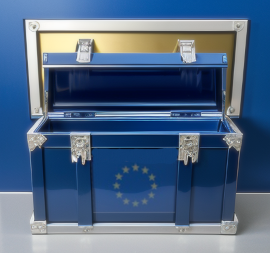-
chevron_right
EU Commission Encourages Use of New Anti-Piracy Toolbox
news.movim.eu / TorrentFreak · Thursday, 21 March - 08:11 · 5 minutes
 Most anti-piracy tools and mechanisms, whether dedicated online platforms or legislation crafted to achieve a particular goal, have issues that affect their performance.
Most anti-piracy tools and mechanisms, whether dedicated online platforms or legislation crafted to achieve a particular goal, have issues that affect their performance.
No matter how tough, legislation could be of date when finally implemented, or reveal itself to be unwieldy in practice, too costly, or simply ineffective. Technical solutions may face compliance and regulatory issues, while pirate adversaries remain light on their feet by ignoring them all.
One key to success for rightsholders is to exploit pirates where they’re most vulnerable, i.e anywhere where they’re reliant on services operated by businesses that already comply with the law and are more likely to take action.
The European Commission’s Recommendation (Toolbox) published on Tuesday, focuses on just that by providing guidance on enforcement, suggesting priority actions, and encouraging use of existing anti-counterfeit/anti-piracy tools.
Cooperation, Coordination and Information Sharing
The Commission says a key aim of the Toolbox is to promote and facilitate effective cooperation between rightsholders, providers of intermediary services, and competent authorities, by promoting good practice and use of appropriate tools and new technologies.
The headline focus is anti-counterfeiting but within the text the EC notes that “most guiding principles, good practices and tools” developed under the recommendation can also be relevant when tackling pirated content online. In particular, voluntary actions taken by online intermediaries, “enhanced cooperation among competent national authorities,” and the sharing of information and data.
Cooperation and increased information sharing are essential and should be further promoted, at all levels, in accordance with Union law, the protection of personal data and the freedom to conduct business under Article 16 of the Charter of Fundamental Rights of the European Union (‘ the Charter ’). Good practices should be identified, and recommended to all actors, including e-commerce marketplaces, transport and logistic service providers, payment services providers, social media providers, providers of domain name services, etc. Secondly, further cooperation and information sharing should be encouraged. This relates to all competent authorities, including market surveillance authorities that currently may not have competences for IP-infringing activities, and promoting further the use of dedicated tools such as the IP Enforcement Portal (‘IPEP’)…
Payment Services, Social Media Platforms
The EC highlights payment services as an area where more can be done. On one hand, these companies are central to rightsholders’ activities. On the other, they can also be used to support IP-infringing activities. The EC says that to prevent misuse of their services for IP-infringing activities, payment services should be encouraged to implement the following good practices:
(a) to clearly state in their terms and conditions, as a ground for suspension or termination of their contract with sellers, any finding, including by the competent authority, of the use of their payment services for IP-infringing activities;
(b) to set up notification mechanisms allowing rightsholders using their payment services to notify any IP-infringing activity;
(c) where technically and economically feasible, to have an information system in place to enable the identification of operators engaging in IP-infringing activities, across different payment services, when one payment service provider has terminated its services with such operators on the grounds of IP-infringing activities;
(d) to exchange information with other payment service providers on trends regarding IP-infringing activities and to put in place specific measures against repeated misuse of their services, particularly where there has been a finding by a competent authority that their services have been used for IP-infringing activities.
Social media providers should similarly prevent misuse of their services, including by having systems in place to identify and take action against those misusing their services for IP-infringing activities.
Domain Name Registries/Registrars
The Commission’s Recommendation naturally assumes that where the law compels intermediaries or service providers to take action, that should be the standard minimum response. However, when entities are asked to go above and beyond, which appears to underpin almost every proposal in the Toolbox, service providers find themselves “encouraged to implement” various measures.
In respect of domain names, Directive (EU) 2022/2555 obliges “TLD name registries and entities providing domain name registration services” to “collect and guarantee the integrity and availability of domain name registration data.” EU Member States should further require these entities to “respond without undue delay” to requests for the disclosure of registration data following requests from “legitimate access seekers.”
Legitimate access seekers include those considered competent under EU or national law for the prevention, investigation, detection, or prosecution of criminal offenses. However, the definition can also encompass anyone with a legitimate reason to access the information, which includes rightsholders and their agents.
When access to domain name registration data that is personal data is sought, TLD-name registries and entities providing domain name registration services established in the EU and/or offering services in the EU are encouraged to recognize as legitimate access seekers any natural or legal persons who make a request for a right to information pursuant to Directive 2004/48/EC .
Member States are further encouraged to share intelligence and data on emerging piracy trends, including lists of websites that have been held by competent authorities to have carried out IP-infringing activities, the tactics and behaviors of alleged infringers, and to explore news ways to share information on those who “repeatedly engage in IP-infringing activities.”
Dynamic Injunctions, Unmasking Petty Infringers
Several EU Member States already have mechanisms in place that allow rightsholders to obtain injunctions against infringers and intermediaries, but the Commission would like to see more.
Specifically, Member States are encouraged to provide for the possibility of dynamic injunctions that can be applied to IP-infringing activities that are similar to those already identified, but are yet to be identified, such as the use of mirror sites.
The Commission also encourages Member States to ensure that petty infringers can’t escape simply because their activities are not commercial in scale or even commercial at all.
“Member States are encouraged to provide for the possibility for the competent judicial authorities to order disclosure of the relevant information to effectively fight IP infringements which are not on a commercial scale, in response to a justified and proportionate request of the claimant in proceedings,” the Commission writes.
“For these purposes, the relevant information could consist of the same information which may be requested in accordance with Article 8(2) of Directive 2004/48/EC , including the email address, telephone number and IP addresses relating to alleged infringers or participants to alleged infringing activities.”
The European Commission’s Recommendation (Toolbox) can be found here (pdf)
From: TF , for the latest news on copyright battles, piracy and more.









